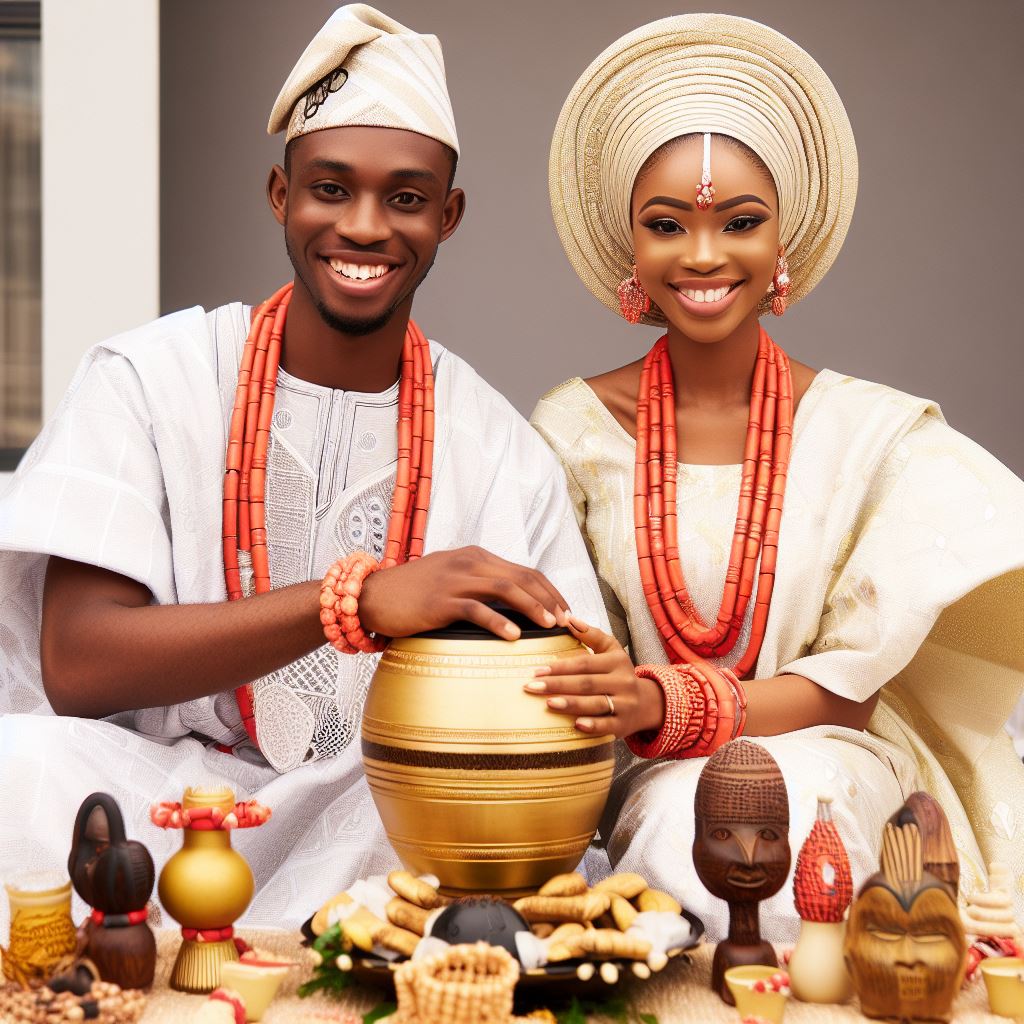Customary Marriage vs. Statutory Marriage: What’s the Difference?
Last Updated on October 13, 2023
Introduction
Marriage holds great significance in Nigeria, serving as a vital institution that brings together couples for various reasons.
It plays a crucial role in preserving cultural heritage, maintaining family ties, and legitimizing relationships.
Nigerian marriage reflects customs, beliefs, and norms of ethnic groups, a deeply rooted tradition.
Nigerian cultural practices recognize customary marriage. Consent and family approval are crucial in customary marriage, involving various rituals.
Statutory marriage, recognized by the government, follows specific laws.
Statutory marriage requires the fulfillment of legal requirements, such as obtaining a marriage license and conducting a civil ceremony.
One key difference between the two types is the legal recognition and protection they offer to couples.
Customary marriage, although culturally significant, does not provide legal protections in the same way statutory marriage does.
In statutory marriages, couples enjoy legal rights and responsibilities, including inheritance rights, property rights, and the ability to seek legal remedies in case of divorce.
Another difference lies in the registration process and documentation required for each type of marriage.
Read: Opinions Divided: Nigerians React to ‘Married at First Sight’
Customary Marriage
Definition and cultural significance
- A customary marriage is a union that is recognized and practiced according to traditional customs and beliefs.
- It holds great significance within various cultures as it strengthens family ties, preserves cultural identity, and upholds ancestral traditions.
Process and requirements for conducting a customary marriage
- Negotiations and payment of the bride price play a vital role in the customary marriage process, symbolizing the groom’s commitment and respect to the bride’s family.
- Traditional ceremonies and rituals are performed to celebrate the union and bless the couple, ensuring the harmony and prosperity of their marriage.
- Community involvement and validation are integral parts of a customary marriage, as it is seen as a union that extends beyond the couple to their families and community.
Legal recognition and implications
- The Customary Marriage Act of 1990 provides legal recognition to customary marriages in many jurisdictions.
- However, the legal protection afforded to women’s rights within customary marriages is limited, often leaving them vulnerable to discrimination and abuse.
- Registration procedures are required to legally validate a customary marriage, ensuring it meets the necessary legal requirements.
Advantages and drawbacks of customary marriage
- Customary marriages reinforce cultural identity and strengthen community ties, promoting cultural diversity and social cohesion.
- On the other hand, customary marriages can perpetuate gender inequalities and lack adequate legal safeguards, particularly for women.
Customary marriage is an essential aspect of many cultures, providing a sense of identity and preserving traditions.
It involves a unique process, including negotiations, ceremonies, and community involvement.
While legally recognized through the Customary Marriage Act, it also poses limitations in terms of women’s rights and requires registration for legal validity.
Despite its advantages in strengthening cultural ties, the disparities it may create highlight the need for a better balance between cultural traditions and legal protections.
Read: The Social Implications of Shows Like ‘Married at First Sight’ in Nigeria
Statutory Marriage
Definition and legal framework
The law recognizes and governs a statutory marriage, which is a formal union between two individuals.
Process and requirements for conducting a statutory marriage
- To conduct a statutory marriage, the couple must first obtain a marriage license.
- They conduct a civil ceremony to formalize the marriage after obtaining the license.
- Ensure marriage validity by requiring proper legal documentation and witnesses.
Benefits and legal protections of statutory marriage
- A statutory marriage grants both partners equal rights and responsibilities in the eyes of the law.
- In the case of divorce, the Marriage Act provides specific regulations regarding property rights and settlements.
- Formal settings like government institutions and financial organizations acknowledge and accept statutory marriages.
Challenges and considerations in opting for a statutory marriage
- One challenge is the higher costs and bureaucratic processes involved in obtaining a marriage license and conducting a civil ceremony.
- Cultural and familial expectations may pose challenges for individuals who opt for a statutory marriage instead of a customary one.
- Some religious or ethnic groups may have limited access to statutory marriage due to religious or cultural beliefs.
Statutory marriage involves a formal union recognized by the law, which requires specific legal processes and documentation.
It provides equal rights and protections for both partners and is widely accepted in formal settings. However, it also comes with challenges such as higher costs and cultural expectations.
Additionally, certain religious or ethnic groups may have limited access to statutory marriage. Consider these factors carefully when choosing between a statutory marriage and a customary marriage.
Read: Modern vs. Traditional: How Nigerians Define Marriage Today

Comparison and Contrast
Distinct features and procedures of customary and statutory marriages
1. Customary marriage
- Usually based on traditions, customs, and cultural practices.
- Requires the consent and involvement of families and communities.
- May involve negotiations, ceremonies, and the payment of dowry or bride price.
- The validity of the marriage is determined by customary law and practices.
2. Statutory marriage
- Governed by legal codes and regulations set by the state.
- Requires the couple to obtain a marriage license and adhere to specific legal procedures.
- Normally conducted in front of an authorized officiant and witnesses.
- The validity of the marriage is determined by compliance with legal requirements.
Cultural and legal implications of each type of marriage
1. Customary marriage
- Reflects and preserves cultural and traditional values.
- Respects the customs and norms of a particular community or ethnic group.
- May reinforce social cohesion and solidarity among families and communities.
- Recognition and legal protection may vary depending on the jurisdiction or country.
2. Statutory marriage
- Emphasizes the legal rights and responsibilities of the individuals involved.
- Provides a standardized framework for marriage, ensuring legal protection and benefits.
- May promote gender equality and individual autonomy within the institution of marriage.
- Offers greater legal recognition and protection across jurisdictions and countries.
Considerations for couples in choosing between the two options
1. Customary marriage
- Can strengthen cultural identity and maintain family ties.
- May face challenges regarding legal recognition, inheritance, and divorce options.
- Requires a deep understanding and acceptance of cultural traditions and norms.
- May be preferable for couples who prioritize community support and acceptance.
2. Statutory marriage
- Provides legal rights, benefits, and protections to both spouses.
- Offers a clear and standardized legal framework for marriage-related matters.
- Allows for easier access to divorce, inheritance, and child custody laws.
- May be suitable for couples seeking legal recognition and equal rights within society.
Potential impacts on gender roles, power dynamics, and family expectations
1. Customary marriage
- Can reinforce traditional gender roles and power imbalances within the family.
- May place greater emphasis on the wife’s subservience and obedience to her husband.
- Can perpetuate gender inequalities and limit women’s autonomy and decision-making power.
- Family expectations may be strongly tied to cultural and traditional norms, potentially restricting individual freedom.
2. Statutory marriage
- Allows for the renegotiation and redefinition of gender roles within the marital relationship.
- Provides a legal framework that promotes gender equality and shared decision-making.
- May challenge traditional family expectations and empower individuals to make independent choices.
- Offers the potential for greater freedom and autonomy for both partners.
Customary and statutory marriages have distinct features, cultural implications, and legal considerations.
Couples should carefully consider their cultural background, legal rights, and personal preferences when choosing between these two options.
It is also important to acknowledge the potential impacts on gender roles, power dynamics, and family expectations, as these factors can significantly influence the dynamics and success of the marital relationship.
Read: Lessons Nigerian Couples Can Learn from ‘Married at First Sight’
Conclusion
The differences between customary and statutory marriages are significant, touching on legal recognition, requirements, and cultural implications.
The importance of understanding these distinctions cannot be overstated. Whether you are planning to enter into a marital union or simply seeking knowledge, this awareness is vital.
We encourage individuals to make well-informed decisions based on their unique cultural, legal, and personal circumstances.
It’s not merely a choice of wedding type but a decision that can profoundly impact various aspects of your life.
Your understanding of these marriage types empowers you to navigate the complexities of matrimonial unions in Nigeria, ensuring that your choice aligns with your values and objectives.
By making a conscious decision, you set the stage for a fulfilling and legally secure marital journey that resonates with your individual needs and aspirations.


